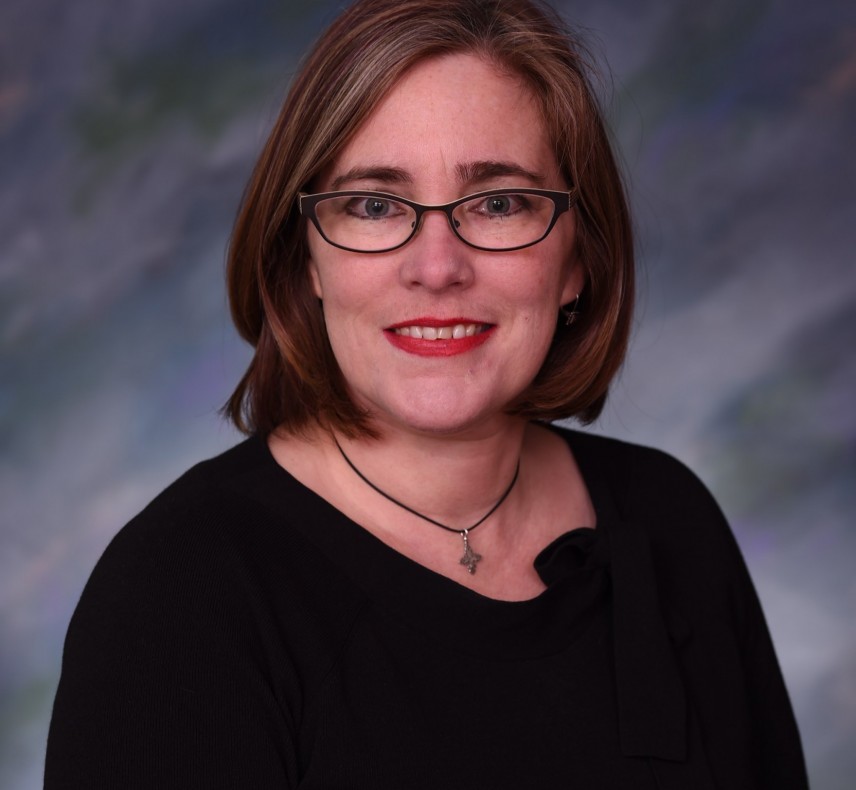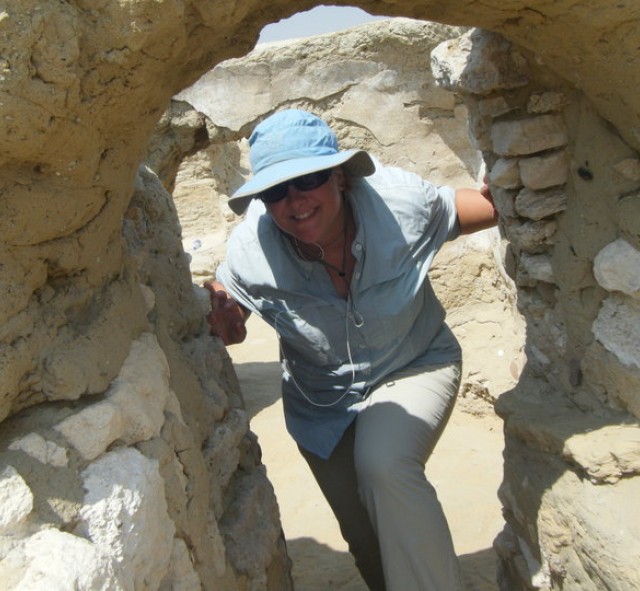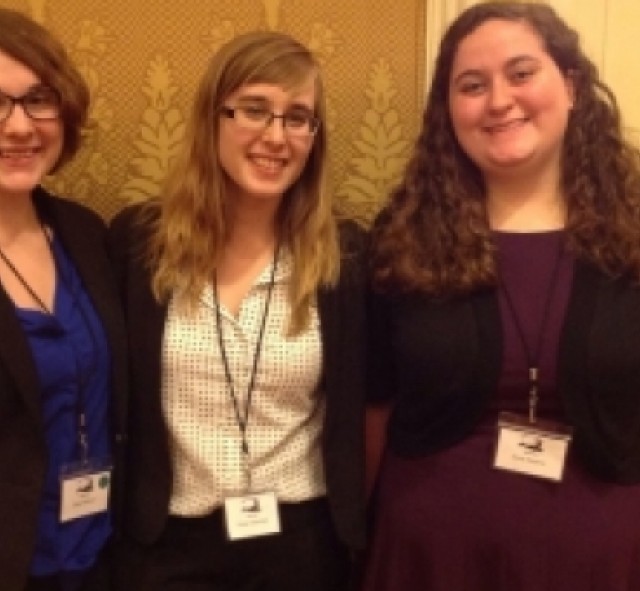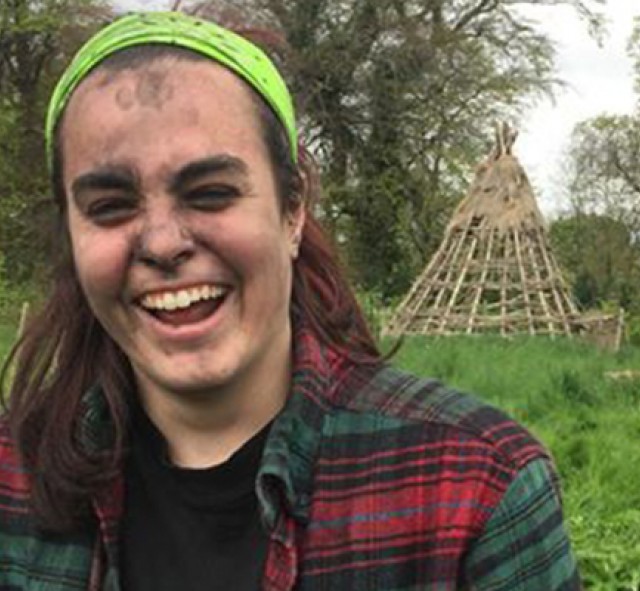Inspiring students on a daily basis, Wittenberg’s Darlene Brooks Hedstrom, professor of history, chair of the department and the director of archaeology at Wittenberg, was recently named the Kenneth E. Wray Endowed Chair in the Humanities.
Her installation took place at 4:30 p.m. Feb. 9, in Ness Auditorium in Hollenbeck Hall. During the ceremony, she spoke on “The Value of History and the Humanities.” Other speakers included Alice-Mary Talbot, director emerita of Byzantine Studies, Dumbarton Oaks Research Library and Collection in Georgetown, Washington, D.C.; and David Brakke, the Joe R. Engle Chair in the History of Christianity and professor of history at The Ohio State University.
“I am very humbled to be selected and nominated by my colleagues in the humanities,” said Brooks Hedstrom, who began at Wittenberg in 2001 following her work as an instructor at Miami University in Oxford, Ohio.
“Being the Wray Chair in the Humanities means I am now able to more effectively enhance the study of the humanities at Wittenberg by bringing scholars to our community and to further represent Wittenberg as I present my research at other universities,” she continued. “I look forward to opportunities to partner with colleagues and other departments to explore how to highlight the value of the humanities for our students.”
The Wray Chair in the Humanities honors a senior faculty member with demonstrated excellence in three areas: teaching, depth and breadth of scholarship, and distinguished publications within one’s profession in the humanities. Brooks Hedstrom is the third faculty member to hold the Wray Chair in the Humanities.
Established by alumna and former member of the Wittenberg Board of Directors Ruth Wray, the chair honors Wray's husband and seeks to recognize Wittenberg’s humanities faculty, whose work she greatly admired.
Brooks Hedstrom was nominated by a committee of faculty colleagues representing each of the humanities departments. Her nomination was then forwarded by Interim Provost and Professor of Psychology Mary Jo Zembar to the Chair of the Wittenberg Board of Directors, The Rev. Jonathan Eilert '93, who, along with the full Board, approved Brooks Hedstrom for this honor at the October 2017 board meeting.
“Professor Brooks Hedstrom is an outstanding teacher as evidenced by her receipts of the 2015 Collegium Award for Excellence and Innovation in Teaching at Wittenberg University,” Zembar said. “As a trained historian and archaeologist, she introduces our students to ancient and medieval worlds in true ‘hands-on history’ style, and with her specialization in the Middle East, she is able to challenge the misunderstandings many students have about this part of the world. She also worked with colleagues to establish an interdisciplinary minor in archaeology and developed the campus archaeology project, which allows her to train students in field methods on our historic campus.”
Brooks Hedstrom’s work focuses on the archaeology of the eastern Mediterranean within the Byzantine and early medieval Islamic periods (c. CE 300-1000). She has authored numerous articles and books on a range of topics including her most recent book (2017) The Monastic Landscape in Late Antique Egypt: An Archaeological Reconstruction published by Cambridge University Press. She is also in the final season of a decade-long Yale monastic archaeology project that will culminate in a four-volume publication by Yale Egyptological Series on the Wadi Natrun excavations.
Her other recent awards include the 2015 Residential Summer Fellow in Byzantine Studies at Dumbarton Oaks Research Library and Collection, in Washington, D.C., administered by the trustees for Harvard University. She was also a Fulbright Scholar in Egypt in 2007-2008.
“As a professional archaeologist, I strive to inject my classes with my experiences and to inspire students to see the value of the material remains from past cultures, both ancient and modern,” she said. “I always wanted to be an archaeologist. History comes alive for me in the tangible artifacts and buildings of the past, regardless of place or time. I strive to bring this into my classes, knowing that some students learn by seeing replicas of artifacts, or viewing images, or reading a letter from an ancient society. I prefer to read history together with my students so that the premodern voices of the past are present in our classroom. It is only when we contemplate together what a royal king from the 14th century B.C. was trying to communicate in his letter or the complex cosmology in a Gnostic gospel that we are learning together.”
As an active archaeologist, she has worked in England, Jordan and Egypt. She is currently working on two book projects, Feeding Asceticism: The Archaeology of Monastic Cooking in the Byzantine East (with Arc Humanities Press) and The Archaeology of an early Medieval Residence at the Monastery of John the Little (Yale Egyptological Series).
“Being at Wittenberg allows me to truly embrace the humanities because the institution is small enough and intimate enough to naturally foster interdisciplinary work,” said Brooks Hedstrom, who earned her bachelor’s and master’s degrees from Wheaton College, Wheaton, Ill., and her Ph.D. at Miami University.
“I know that when I reference theories of post-modernism in my history class that some students have studied this in other departments. Or, when I talk about the importance of liminal spaces that students in sociology are able to contribute what they have learned elsewhere. Perhaps the greatest joy I have at being at Wittenberg is the ability to have an ongoing excavation on our campus as part of an effort to document and explore Wittenberg’s history firsthand. The ability to teach students to learn field methods, to develop skills in researching 19th and 20th century history in Springfield, and to offer a course that takes them into the community we live in are all part of what makes Wittenberg unique.”







